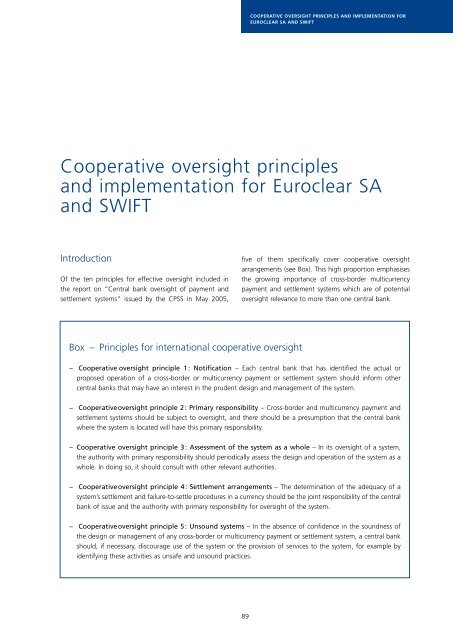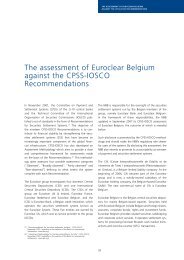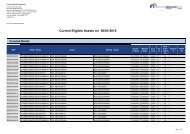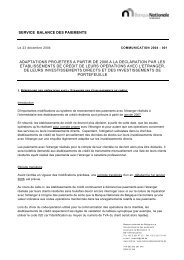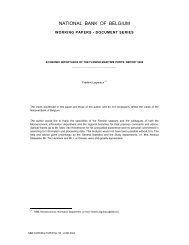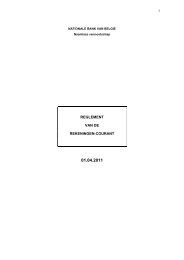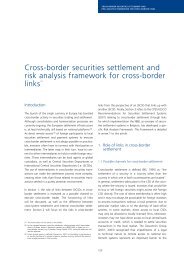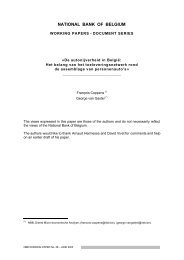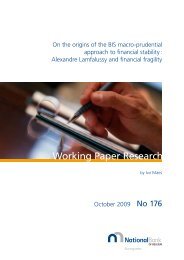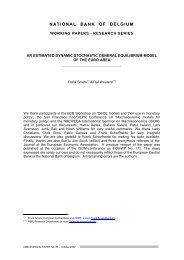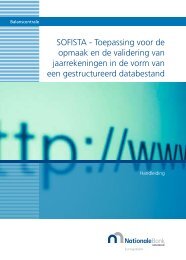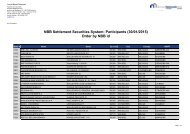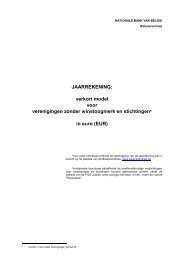Cooperative oversight principles and implementation for Euroclear ...
Cooperative oversight principles and implementation for Euroclear ...
Cooperative oversight principles and implementation for Euroclear ...
Create successful ePaper yourself
Turn your PDF publications into a flip-book with our unique Google optimized e-Paper software.
of the MoU <strong>and</strong> will there<strong>for</strong>e not be discussed as suchwithin the cooperative <strong>oversight</strong> framework betweencentral banks that is being described here.<strong>Cooperative</strong> <strong>oversight</strong> principle 5 :Unsound systemsIn the specific arrangement under review here, eachnational central bank remains responsible <strong>for</strong> the <strong>oversight</strong><strong>and</strong> the supervision of its domestic (I)CSD <strong>and</strong> theassociated SSSs which it manages. As regards ESA, theservices it provides <strong>and</strong> its management fall within thescope of the above-mentioned MoU, <strong>and</strong> the cooperative<strong>oversight</strong> arrangements described above are applicable.As <strong>for</strong> Belgium, the NBB can, if necessary, discourage theuse of the Belgian systems or – within the frameworkdescribed above – discourage the provision of ESA servicesto a system.2. SWIFT2.1 International cooperative <strong>oversight</strong>arrangement <strong>for</strong> SWIFTCentral banks generally have the explicit objective offostering financial stability <strong>and</strong> promoting the soundnessof payment <strong>and</strong> settlement systems. While SWIFT is nota payment or settlement system itself <strong>and</strong>, as such, isnot regulated by central banks or banking supervisors, alarge <strong>and</strong> growing number of systemically important systemshave become dependent on SWIFT, which has thusacquired a systemic character. If SWIFT were insufficientlyprotected against risk, disruption in financial messagingcould trigger or transmit further disruption amongst itsusers.Because of this, the central banks of the G10 conduct<strong>oversight</strong> of SWIFT, with the NBB as lead overseer, asSWIFT is incorporated in Belgium. Other central banksmay also have a legitimate interest in or responsibility<strong>for</strong> <strong>oversight</strong> of SWIFT, given its role in their domesticsystems.The major instrument <strong>for</strong> the <strong>oversight</strong> of SWIFT is moralsuasion. During the dialogues with the SWIFT board <strong>and</strong>management, overseers <strong>for</strong>mulate their recommendationsto SWIFT. No G10 central bank currently has directstatutory instruments (such as sanctions, fines or <strong>for</strong>malprior approval of changes) to <strong>for</strong>mally en<strong>for</strong>ce decisionsupon SWIFT. Overseers exert influence via a series ofother mechanisms to ensure that SWIFT takes account oftheir recommendations, including in<strong>for</strong>ming SWIFT users<strong>and</strong> their supervisors about <strong>oversight</strong> concerns related toSWIFT.The common underst<strong>and</strong>ing of overseers <strong>and</strong> SWIFTabout the <strong>oversight</strong> objectives, <strong>and</strong> the activities that willbe undertaken to achieve those objectives, is laid downin a protocol. The protocol arrangement was signedbetween the NBB, as the lead overseer, <strong>and</strong> SWIFT. It canbe revised periodically to reflect the evolving <strong>oversight</strong>arrangements. The NBB has also concluded bilateral MoUswith each of the other central banks involved in the <strong>oversight</strong>of SWIFT.The NBB monitors SWIFT developments on an ongoingbasis. It identifies relevant issues through the analysis ofdocuments provided by SWIFT <strong>and</strong> through discussionswith the management. It maintains a continuous relationshipwith SWIFT, with ad hoc meetings on a regular basis,<strong>and</strong> serves as the G10 central banks’ entry point <strong>for</strong> thecooperative <strong>oversight</strong> of SWIFT.The various SWIFT <strong>oversight</strong> groups are structured asfollows :− the SWIFT <strong>Cooperative</strong> Oversight Group (OG), composedof all G10 central banks, the ECB <strong>and</strong> the chairmanof the G10 CPSS, is the <strong>for</strong>um through whichcentral banks conduct cooperative <strong>oversight</strong> of SWIFT,<strong>and</strong> in particular discuss <strong>oversight</strong> strategy <strong>and</strong> policiesrelated to SWIFT ;− within the OG, the Executive Group (EG) discusses withSWIFT’s board <strong>and</strong> management the central banks’<strong>oversight</strong> policy, issues of concern, SWIFT’s strategyregarding <strong>oversight</strong> objectives <strong>and</strong> conclusions. The EGsupports the NBB in preparing <strong>for</strong> discussions withinthe broader OG <strong>and</strong> represents the OG in discussionswith SWIFT. The EG can present recommendations toSWIFT on behalf of the OG ;− at the technical level, the Technical Oversight Group(TG) meets with SWIFT management, internal audit <strong>and</strong>staff to carry out the groundwork of the <strong>oversight</strong> process.Specialised knowledge is needed to underst<strong>and</strong>SWIFT’s use of computer technology <strong>and</strong> the associatedrisks. The TG draws its expertise from the pool of staffavailable at the cooperating central banks. It reports itsfindings <strong>and</strong> recommendations back to the OG.2.2 Assessment of SWIFT <strong>oversight</strong> against the<strong>Cooperative</strong> Oversight PrinciplesThe Principles <strong>for</strong> International <strong>Cooperative</strong> Oversighthave been developed with cross-border <strong>and</strong> multicurrencypayment <strong>and</strong> settlement systems in mind. As SWIFT isneither of these systems, but essentially a major services92
<strong>Cooperative</strong> <strong>oversight</strong> <strong>principles</strong> <strong>and</strong> <strong>implementation</strong> <strong>for</strong><strong>Euroclear</strong> SA <strong>and</strong> SWIFTprovider to the global financial infrastructure of relevanceto the <strong>oversight</strong> activities of many central banks, thePrinciples, if applicable to SWIFT, need to be reinterpretedto suit the specificities of a services provider in which themajor sources of risk are almost exclusively of an operationalnature, <strong>and</strong> in which typical risks of (multicurrency)payment <strong>and</strong> settlement systems are absent. A reinterpretationof each Principle suitable to SWIFT is given below.<strong>Cooperative</strong> <strong>oversight</strong> principle 1 : NotificationInterpretation <strong>for</strong> SWIFT : TransparencySWIFT is a messaging services provider that has financialinstitutions in more than 200 countries as clients. Thecross-border dimension is inherent to the majority ofthese services, <strong>and</strong> SWIFT is well-known to central banksthroughout the world. This is, amongst other reasons,because many central banks are SWIFT users themselves,<strong>for</strong> instance, <strong>for</strong> the messaging services in their country’slarge value payment system, which is most often eitheroperated by or set up under the authority of the centralbank. When central banks become SWIFT members, theyget involved in the SWIFT governance process <strong>and</strong> arethus in<strong>for</strong>med of changes at SWIFT or are consulted onintended changes through the SWIFT consultation processes.Furthermore, they can obtain in<strong>for</strong>mation on theexternal security auditor’s yearly assessment of the SWIFTcontrol framework (control objectives, criteria <strong>and</strong> supportingcontrols) in SWIFT’s SAS 70 report. Transparencyto central banks is thus provided by SWIFT itself in thesame way as SWIFT provides in<strong>for</strong>mation to its otherusers.Besides the disclosure of in<strong>for</strong>mation by SWIFT, overseersalso communicate on the international cooperative<strong>oversight</strong> arrangements <strong>for</strong> SWIFT. In its role as leadoverseer of SWIFT, the NBB has been describing publiclyvarious aspects of the arrangements in several issues ofits Financial Stability Review <strong>and</strong> annual report. Similarreferences are made by the other G10 central banksinvolved in the cooperative <strong>oversight</strong> of SWIFT. On an adhoc basis, the NBB also keeps in contact with non-G10central banks, to explain the SWIFT <strong>oversight</strong> arrangementsto them.<strong>Cooperative</strong> <strong>oversight</strong> principle 2 :Primary responsibilityInterpretation <strong>for</strong> SWIFT : Responsibility according toSWIFT’s role in domestic systemsIn the international cooperative <strong>oversight</strong> arrangement<strong>for</strong> SWIFT, the NBB, as lead overseer, is the primary pointof contact between SWIFT <strong>and</strong> the overseers. Oversightassessments are a joint undertaking by the G10 centralbanks. In the various SWIFT <strong>oversight</strong> groups, representativesfrom the G10 central banks aim at buildingconsensus views in order to communicate their commonassessment <strong>and</strong> recommendations to SWIFT. It wouldbe inefficient, <strong>and</strong> could lead to inconsistent actions, ifcentral banks acted in an uncoordinated way. The G10central banks act in close cooperation so as to give centralbanks more influence over SWIFT than they would haveif acting on a solo basis. However, the joint undertakingof the G10 <strong>oversight</strong> activities vis-à-vis SWIFT does notbring about any changes in the regular division of responsibilitiesbetween central banks, since each of these bankscontinues to assume responsibility according to the extentto which SWIFT is being used in its domestic payment <strong>and</strong>settlement systems.It is true that the smooth operation of SWIFT is alsorelevant to central banks beyond the confines of theG10 central banks that are conducting the internationalcooperative <strong>oversight</strong> of SWIFT, as these non-G10 centralbanks are responsible <strong>for</strong> monitoring the smooth operationof their own domestic systems. As there is a limit tothe number of people that can directly interact effectivelywith SWIFT, the overseers of SWIFT are open to dialoguewith other central banks, on the one h<strong>and</strong>, to assist themin identifying relevant in<strong>for</strong>mation that is readily availablefrom SWIFT, <strong>and</strong>, on the other h<strong>and</strong>, to in<strong>for</strong>m them ofthe set-up of the SWIFT <strong>oversight</strong> arrangements.<strong>Cooperative</strong> <strong>oversight</strong> principle 3 : Assessment ofthe system as a wholeThis principle can be deemed applicable to SWIFTunamendedOverseers developed the High Level Expectations <strong>for</strong> theOversight of SWIFT as a tool in assessing the SWIFT systemas a whole. The High Level Expectations are presented ina separate article of this Financial Stability Review. Thetopics identified <strong>for</strong> an <strong>oversight</strong> review at SWIFT are beingselected on the basis of a risk-based <strong>oversight</strong> assessmentwithin the framework of the High Level Expectations. Asa starting point, the whole SWIFT organisation <strong>and</strong> allits various activities are being considered, but only those93


